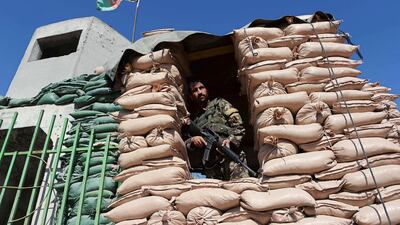JALALABAD, AFGHANISTAN // Gul Ahmad’s 14-year-old brother disappeared from the streets of Jalalabad in the middle of winter. For 10 days the family looked everywhere for him, rushing to the homes of relatives and searching in panic at local hospitals.
Just as they were about to give up hope, Gul Ahmad received a phone call. Speaking in Pashto with an accent that sounded like he was from the nearby district of Khogyani, the man on the other end of the line said the boy had been kidnapped.
He demanded a ransom of 1.2 million Pakistani rupees – a currency commonly used in eastern Afghanistan.
“If you don’t pay this, your brother will not be part of your family anymore,” he threatened.
Gul Ahmad’s name has been changed to protect his identity. For reasons he has not been able to ascertain, his brother was sucked into a web of criminality and corruption that has left people across this city in eastern Afghanistan living in fear.
The violence, extortion and intimidation is routinely blamed on a handful of powerful clans with strong links to the political establishment.
Residents were too frightened to openly name those allegedly responsible, but with hushed tones and furtive glances they offered a glimpse into a wider pattern of abuse of power that has become deeply entrenched here.
The case of Gul Ahmad’s brother is just one of several abductions in Jalalabad during recent months. After the kidnappers first made contact, they lowered their ransom demand but warned him of dire consequences if he did not pay.
“Our boss said we will cut off one of your brother’s hands, his nose and one of his legs,” they said.
Negotiations with the kidnappers went on for four days. In the end, they settled on a ransom of 100,000 Pakistani rupees (Dh3,506).
On the day of the exchange, Gul Ahmad, 22, put the money in a black plastic bag as instructed and boarded a motorised rickshaw. Over his mobile phone, the kidnappers directed him to nine different locations until he reached a remote area on the city’s outskirts called Sorkh Dewall, the Red Wall.
He left the rickshaw and walked towards some mountains, where he saw a group of men armed with Kalashnikovs, their faces covered.
Still communicating by phone, they told him to continue walking towards the mountains, where he should drop the money and leave. A few minutes later he was reunited with his brother.
“He was crying and couldn’t talk,” said Gul Ahmad.
Abducted while on his way to a local mosque, the teenager was missing for a total of two weeks. Unlike in similar incidents, he did not come from a wealthy family and appears to have been the victim of mistaken identity.
He was held in an underground room with about 20 other captive children. They were fed twice a day but not allowed to talk to each other. Watched over by armed guards, a light was kept on in the room day and night.
"We are very scared now because they know us but we don't know them," said Gul Ahmad, explaining to The National why he could not talk openly.
“I am sure they are so strong they will hear about anyone who complains and give them their own kind of answer in reply,” he said indicating that they will be met with violence.
Jalalabad is the capital of Nangarhar province and serves as a vital hub for cross-border trade with neighbouring Pakistan. The city has long been considered relatively safe, but its reputation is changing as rival groups battle for political and economic control.
While the Taliban and ISIL compete for territory in surrounding districts, residents told The National that Jalalabad has become a fiefdom for several mafia-like families who hold positions throughout the political establishment and made their names in the anti-Soviet resistance of the 1980s.
As well as alleged involvement in kidnapping and extortion, they are accused of land-grabbing.The heads of these clans include Haji Zahir Qadir, the deputy speaker of Afghanistan’s lower house of parliament, Fazel Hadi Muslimyar, the speaker of the senate, and Hazrat Ali, an MP.
Two other former mujahideen commanders, Haji Mohammed Zaman and Sayed Ahmad Pahlawan, have been killed in recent years but their families continue to exert huge influence in and around Jalalabad.
The National was unable to find anyone willing to name these men on the record. An Afghan whose brother was recently abducted joked that he would talk about the case in exchange for a visa to Germany. That was the only way he could feel safe, he explained.
Some of the dominant families have relatives on the provincial council. One of their fellow councillors declined to discuss the kidnappings but another, Zabiullah Zmari, was more forthcoming. He said “all kinds of crimes are happening here” and confirmed that a number of powerful families were involved but declined to identify them.
Mr Zmari described the perpetrators as “mafia” and “warlords” who could be seen driving around the city in cars with blacked out windows and no licence plates. “All the power and control is in their hands,” he said.
In one high-profile incident, the elderly father of the chief justice of Afghanistan’s supreme court was kidnapped in March while on his way to a mosque in Jalalabad. He was freed after about two weeks.
In another case, the 17-year-old son of an engineer was abducted and, like Gul Ahmad’s brother, held in an underground room with a number of other children. He was released after four days.
The engineer, who spoke on condition of anonymity, has sent his family to Kabul for their safety.
“We don’t want anything from the government,” he said. The kidnappers “are part of it”.
foreign.desk@thenational.ae

